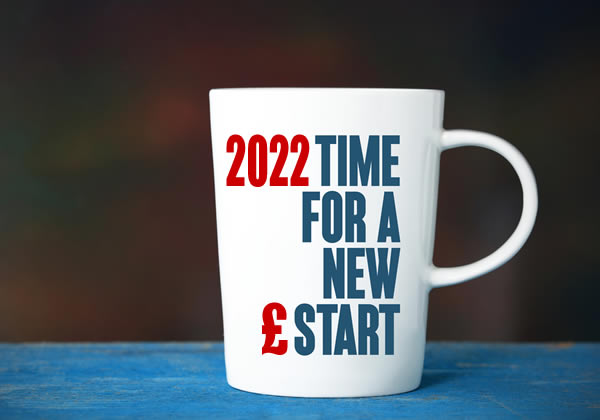 Is your main aim in 2022 to be better with money, clear your debts or save a house deposit?
Is your main aim in 2022 to be better with money, clear your debts or save a house deposit?
This could be a New Years Resolution – perhaps the result of a Christmas financial hangover. You could think of this as being a financial detox for when your bank balance looks sick and your debts look bloated.
Or you could need it at any time during the year when you realise things have to change.
Here are ten ideas that may help.
Everyone is at a different point on their money journey. If you have never thought much about money in the past, a lot of this may be new to you. If your income is just too low, then some of the suggestions may seem fanciful or even insulting…
You don’t have to do them all at once, pick a couple that sound most useful and go for them first.
Contents
Less debt makes every other financial ambition easier
Whatever you want financially in 2022 and future years, it is going to be easier to achieve if you have less debt.
Do you want to buy a house this year or next? Do you want to clear the mortgage as soon as possible?
Maybe you want a less stressful job which will pay less. Are you thinking of starting a family but worried about maternity pay?
Or are you simply sick of handing over so much of your pay to the banks each month?
Less debt means more freedom to do what you want.
Cut your expenses
1) Check your subscriptions and regular payments
Check all your Standing Orders and Direct Debits – that’s money just vanishing from your salary. The Emma app can help you identify them all. It checks your bank account and credit cards for regular payments.
There may be some you have forgotten about! And others which you like, but the total going out each month is just too high.
Magazine subscriptions? Paying for ad-free apps? A free trial that wasn’t canceled? Insurance you don’t need any more? Monthly deliveries to keep your spirits up during lockdowns?
Also check with your partner that you aren’t duplicating things like Netflix, Amazon Prime or Spotify subscriptions, or insurances.
If you decide you don’t want a service or a subscription, remember to tell the firm, don’t just cancel the payment at your bank.
2) Get an overview of what happens when in the year
It’s useful to get a map of the rest of your financial year – you can use a calendar or diary. Make a note about when insurances and contracts such as mobiles and broadband end. And when your car needs an MOT. And when interest rates will change, because a 0% deal or a mortgage fix ends.
The UK regulator has introduced new rules so that insurers shouldn’t “walk up the prices” for current customers – but it’s still good to see if you can save money by switching.
See if you are overpaying for TV packages or could manage with fewer ones. As streaming services multiply you can’t afford to keep on adding new ones unless you let some of the others go.
Have a look at your mobile expenditure. Upgrading at the end of a contract can sound appealing but keeping a phone for another year on a SIM-only contract will work well for many people. MSE’s Cheap Mobile Finder can help.
If you are on Universal Credit, Pension Credit or some other benefits, you can get cheaper broadband from BT – your current broadband provider may also have a cheaper tariff you can switch to.
3) What is your weakness?
Be honest with yourself!
Is it online spending? It is so easy to idly look for something and then a couple of taps and it’s on its way to you. But is it too easy for the sake of your bank balance? If you think that is your big weakness, have a look at tips to let you get online spending under control.
Clothes? Setting a budget and sticking to it is the traditional answer, but for adults with plenty of clothes already, have a look at having a no-spend 6 months or a year. If clothes shopping is one of your main hobbies, consider only buying second-hand clothes, from Vinted, eBay, charity shops etc.
Food, takeaways and eating out? Too tired after work to cook? See How to cut your grocery bill and still eat well for ideas.
Tackle those debts
4) Get a list of your debts
Make a list of all your debts – how much you owe and the minimum monthly payments. Find out the interest rate on them – and if it is at 0%, when is that going to change.
The less you want to do this, the more important it is!
Include everything, not just the obvious credit cards and loans. Your overdraft. Klarna and any other buy now pay laters amounts owed. Arrears on important bills (rent, council tax utilities). Money owed to family or friends.
Make sure you know which of these debts and bills are top priority.
5) Pay less interest
With a good credit rating, you may be able to refinance credit card or other expensive debt and save a lot of interest.
In 2022 there are still some good 0% deals on offer, they are shorter, with higher fees and lower credit limits than they were a couple of years ago but grab one if you can.
Don’t forget your mortgage! It may be “good debt” and it’s a lot cheaper than other sorts of debt, but this is probably one of your biggest bills so getting even 0.5% off is well worth doing.
If your fixed-rate has ended, you may be able to cut your interest rate by switching now, but even if you can’t cut your costs much, it’s good to get a fix for as long as possible so you are protected against future rises.
But be very, very careful about consolidation loans. Too often they are a trap, and you end up deeper in debt. If you can only consolidate at high interest (anything over 10%) take debt advice about your other options before you do this.
6) Overpay your debts
If this is impossible as you can’t even manage the minimums, skip this and go to (10) below.
If you only pay the minimum on a credit card, store card or catalogue it will often take more than 20 years to clear it, as the minimum drops a tiny amount each month.
This is the minimum payment trap and there is a surprisingly easy way out, as that link explains. If you want to clear a card but can’t afford to pay a lot to it, try it! NB this only works if you can stop using the account for new spending.
Take this to the next level by reading up on Snowballing – it’s the fastest way to clear debt and end up with a great credit rating.
Better budgeting
7) Get a budget
Many people make excuses about why they don’t have a budget – but there aren’t any good reasons. Even if you can manage without a budget, you will probably do better with one!
You can draw up your own spreadsheet, but instead I suggest you use National Debtline’s online Budget tool. This:
- converts weekly, fortnightly and annual incomes or expenses into monthly figures so they can be added up;
- suggests things you may not remember about such as haircuts, prescriptions, car breakdown cover, vets bills etc.
Don’t be too optimistic when you are doing this – you need to be able to live on these numbers for years, not just scrape through for the next month.
Does your budget balance? This means your income is more each month than your expenses and the minimum payments to your debts.
If it doesn’t, can you improve it… earn more, spend less… If you can’t, then you should talk to a debt adviser, see (10) below.
8) Get a bills account
One simple approach to budgeting that can make a dramatic difference is to get a separate account for your bills. You fund this on your payday – both halves of a couple put their share in. And have all the direct debits and standing orders go out from that account when they are due.
The result is the important bills are paid and the money that is left in your main account is all there is to spend for the rest of the month. With less money sloshing around in the account in the week after payday, there is less temptation to overspend and then find you are short for the rest of the month.
Take this one step further with the piggy banking approach, where you get separate accounts, or “pots” within an account with names you can choose, to save for specific expenses. Some people call these “sinking funds”. If you want £500 to spend on Christmas next year, move £42 a month into a pot for it.
9) Find an easy way to save
Having an emergency fund can really cut down on stress. Perhaps you try to keep some spare money in your normal bank account for a rainy day, but all too often you will find it isn’t there when you need it, you have spent it on something that wasn’t an emergency.
If you never seem to have enough money to save, look at Plum. This is a savings app that moves small amounts of money that you won’t miss out of your current account several times a month. For people who think they should have money left at the end of the month but never do, this can work really well.
If you need to save large amounts of money, for a house deposit or your pension, then the best approach is “pay yourself first”. Set up a standing order to move the money out of your everyday bank account as soon as you are paid.
For other ways to save small and large amounts of money read 7 ways to save – which will work best for you? This is a very personal choice – what appeals to one person may not work for someone else.
And finally…
10) Get debt advice when you need it
If your budget doesn’t balance it’s best to get help from an expert as soon as possible. A good debt adviser will explain your options and the pros and cons – the decision is up to you.
Putting this off or borrowing more normally means that your debt gets worse. It’s best to avoid dragging your family into your mess by getting them to take a loan for you or acting as guarantor – this can make it harder to resolve your debt problems.
Who you should talk to depends on your situation, see Good places for debt advice for details.
Don’t be tempted by ads on Facebook, Instagram or at the top of google search pages from firms offering to write off 81% of your debt. They are looking to make a lot of money out of you, even if they say their advice is free.



Richard says
Thanks Sara lots of excellent suggestions. I’d add consider joining a credit union. They have a brilliant track record of turning borrowers in to savers and eventually becoming free.
John says
Hi Sara. Can you make a claim against credit unions for the interest they charge ?
Sara (Debt Camel) says
Was the loan unaffordable for you? Should they have realised this?
Heyhoo says
I have claimed against one so far and adjudicator from FOS ruled in my favour. I complained it was not affordable. Two loans. Waiting for next step.
Amandeep Singh says
Excellent tips, Sara. Checking on my existing subscriptions and paying only for the ones that add real value to my life and that I love to use is one of the first things I sorted out.
Getting rid of the unwanted stuff (physical or these subscriptions) is gratifying :)
Best
Aman